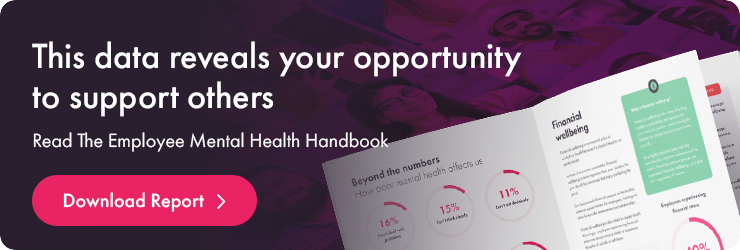Creating a safe and inclusive work environment is crucial for the overall wellbeing of employees, especially those from marginalised communities.
And with over half of LGBTQ+ people experiencing depression each year, organisations must recognise the importance of supporting this group within the workplace.
One route to developing this support is through the use of Employee Resource Groups (ERGs): internal communities of workers with shared identities and interests.
When used effectively, they are key to fostering a more diverse and inclusive workplace.
To get the inside track on developing ERGs for LGBTQ+ employees, we spoke to Leanne Taylor, Senior Creative and I & D Champion at insurance giant Gallagher.
Leanne was key to establishing Gallagher’s LGBTQ+ and Allies network and is passionate about the positive role it has played within the business.
Creating a community
The Gallagher UK LGBTQ+ and Allies network began with a small group of individuals who aimed to support the unique experiences of LGBTQ+ employees.
The initial aim of this group was to create a sense of connection within the organisation. Simply knowing that others share similar experiences can alleviate the isolation often experienced by marginalised groups.
The network reached out across business divisions, ensuring that employees in different teams knew they were not alone. Over time, the network grew exponentially, with over 100 members joining in just a couple of years.
“People want to feel seen and connected. If you’re the only LGBTQ+ person in your department, you can feel isolated but often there’s someone else in the company with similar experiences,” adds Leanne.
Advocacy and awareness
In addition to providing peer support, the Gallagher UK LGBTQ+ and Allies network actively engages in advocacy and awareness initiatives within the organisation.
This includes organising Pride events, fundraising for World Aids Day, celebrating diversity, and fostering a sense of unity and allyship within the organisation.
The network also commemorates key dates – such as LGBTQ+ History Month – by inviting influential speakers to share their lived experiences and insights.
By raising awareness and aiming to reach a wide audience, whether part of a network or not, organisations can take steps towards encouraging allyship and creating a more inclusive workplace.
Shaping policy
While standard policies – like adoption leave and equal discrimination – can often be seen to cover LGBTQ+ needs, there is a huge need for more progress in other areas. This includes policies that support and protect the rights of transgender and gender non-conforming employees.
By actively engaging with the organisation’s leadership, employee groups and networks can have a say in policy development and implementation.
And by advocating for policies that support gender transition, inclusive dress codes, shared bathroom spaces, and medical transitioning support, ERGs can offer the insight of lived experience to creating an environment where all employees feel supported, respected, and visible.
Benefits of ERGs for LGBTQ+ employees
One of the key things that ERGs offer employees is support and recognition that their experiences matter.
It can be challenging for individuals from minority communities to explain to others why workplace support is essential or how it directly impacts their lives.
However, acknowledging the lived experiences of LGBTQ+ individuals and the unique challenges they face is crucial in supporting their wellbeing.
ERGs, like Gallaghers LGBTQ+ group, provide a community of like-minded people who understand and validate each other’s experiences, creating a supportive and empathetic environment.
Impact on wellbeing
By establishing a sense of connectedness and belonging, the network addresses the feelings of isolation often experienced by LGBTQ+ individuals in the workplace, the Gallgher UK LGBTQ+ and Allies network has positively influenced the wellbeing of LGBTQ+ employees.
Surveys conducted within Gallagher indicate that employees appreciate the support provided by the network. This is critical – feeling supported and accepted at work can significantly impact overall wellbeing, particularly when we face challenges outside of the workplace.
‘Anti-LGBTQ+ rhetoric and hate crimes are on the rise – the outside world can feel unsafe to the LGBTQ+ community but we can help people by creating a work environment that feels safe and supportive,’ notes Leanne.
Long-term support
Creating a workplace that supports the wellbeing of LGBTQ+ employees is a journey.
The Gallagher UK LGBTQ+ and Allies network serves as a powerful example of the impact that a dedicated and inclusive community can have.
Gallagher has demonstrated that by fostering a sense of connectedness, advocating for inclusive policies, and educating stakeholders, these networks can make a real difference.






